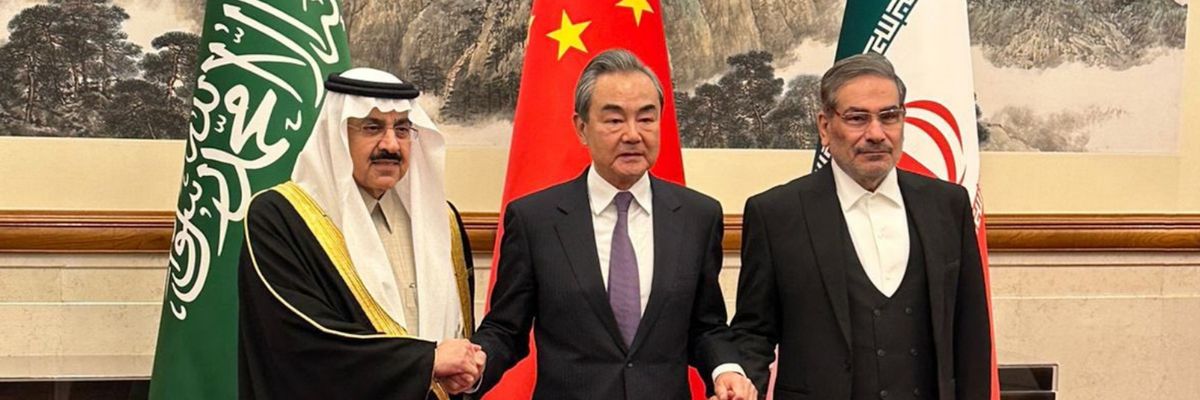The Weakening of US Hegemony in the Middle East: an Interview with Uzma Siraj

Credit: Natália Constantino
By Karime Cheaito, Isabela Agostinelli and Arturo Hartmann* [OPEU Entrevista]

Prof. Uzma Siraj (Source: Center for International Security Saint-Pierre
In this OPEU Interview, we converse with Professor Doctor Uzma Siraj, who has been a faculty member at the Federal Urdu University (Islamabad, Pakistan) since 2004 and is currently an Assistant Professor and Head of the Department of International Relations at the university. Siraj holds a PhD in International Relations from the International Islamic University (Islamabad). Her main research areas are Central Asia and post-Soviet states, with specific interests in energy security, the region’s energy politics, and the roles of regional and global powers, especially Russia and China.
In this interview, we question Siraj about the positioning and involvement of great powers, notably the USA, Russia, and China, in the Middle East, with a specific focus on the ongoing genocide in the Gaza Strip, Palestine. Among the main topics discussed are domestic politics and elections in the USA; international public opinion regarding Israel; the “hegemonic reordering” in the Middle East; Iran’s nuclear issue; and the role of the BRICS.
This interview is part of the research project developed within the framework of the National Institute of Science and Technology for Studies on the United States (INCT-INEU), coordinated by Prof. Dr. Reginaldo Mattar Nasser (PUC-SP) and titled: “The disputes among great powers and the new geopolitics in the Greater Middle East: redefinitions in the regional alliance system.”
Also as part of this project, we conducted interviews with Ilan Pappé, Trita Parsi, and Stephen Walt, which were published by the journal Tensões Mundiais (UECE) in June 2024.
OPEU: For the first time, we saw large-scale international demonstrations in support of Palestine and condemning Israel’s actions in various parts of the world, including a massive and striking presence on the streets of cities in the U.S. and Europe. What are the possible repercussions for international public opinion regarding Israel? What kind of reflection can we make specifically about public opinion in the U.S. and how might it affect the country’s domestic policy related to Israel, especially in the context of the upcoming presidential elections?
Israeli policies regarding Gaza have sparked a huge debate all around the world. It has caused a fury among different strata of the US society. A sharp decline in the support of Biden indicates the disapproval of US policy for Israel. The gross human rights violations in Gaza and the media’s projection, especially footage gone viral on social media, have sparked a hue and cry. It has become hard for the US administration to snub these voices. This conflict has accelerated the split in the US and highlights its crippled and falling strategy and credibility in the Middle East and its own territory. A recent report by Arab American Institute think tank showing a staggering 42 percent drop-in support among Arab American communities since 2020. Respondents also overwhelmingly said they had a negative attitude toward Biden, with his approval rating tumbling to 29 percent, according to media reports. Though Arab Americans and other Muslims make up a small part of the electorate in the US, their population is growing, and these voters can be a critical voting bloc in tight elections, particularly in a few swing states, for example, Arizona where Biden had been a slight favorite to win the state in 2020.
 On Sunday July 14, one hundred people gathered in Rittenhouse Square in Philadelphia in protest of the “genocidal starvation campaign” waged against Gaza (Credit: Joe Piette/Flickr)
On Sunday July 14, one hundred people gathered in Rittenhouse Square in Philadelphia in protest of the “genocidal starvation campaign” waged against Gaza (Credit: Joe Piette/Flickr)
However, since the election still has some months and the Palestine-Israel conflict might not last that long, how the Palestine-Israel war will affect the US presidential election remains unclear given the great influence of Jewish groups in politics, finance, and other sectors in the US. But one thing is certain – the divide in US society is further deepening, posing a greater challenge to future governance. If these anti-Israel, anti-Biden demonstrations go unresolved by late summer, Donald Trump stands to gain from them. If he wins the presidency, Trump would be dependent on Christian Zionists and evangelical Christians who support Israel. This could give the Israeli government more confidence to impose far more control over Gaza and perhaps the occupied West Bank. And consequently, this would worsen the domestic political scenario for the US.
OPEU: We are seeing a resurgence of civil movements critical of the US in the countries of the Middle East and, in general, in most of the countries of the Global South, which have been more critical of Israel’s actions. How do you analyze the US situation in the Middle East? Can we talk about a “reordering” between the hegemonic powers in the region?
Middle East affairs are intricate and multidimensional, involving a range of geopolitical, economic, and sociocultural elements. The reappearance of anti-US civil groups in the Middle East and the Global South is indicative of a wider resentment of US foreign policy in the region, especially regarding its backing for Israel and its interventions in other nations.
Historically, the US has supported Israel militarily, economically, and diplomatically as a steadfast friend. Many in the Middle East see this support negatively, particularly in light of Israel’s treatment of Palestinians and its occupation of Palestinian territory.
For geopolitical purposes, the US has backed a number of authoritarian governments in the area, putting stability and its own interests ahead of democratic values and human rights. Movements for democracy and civil society organizations have attacked this backing. Some believe that US economic practices and policies, such as resource extraction and neoliberal economic reforms, are harmful to the interests of the local populace, aggravating socioeconomic disparities and fueling poverty and marginalization. There are changes taking place with regard to the “hegemonic reordering” in the region, in part because of the evolving dynamics of power and influence on a global scale. Emerging powers like China and Russia, as well as regional players like Iran and Turkey, are posing a growing threat to the old hegemonic powers of the Middle East, which include the US and certain European nations. These changes are creating complex geopolitical dynamics in the region by changing alliances and alignments. To be more specific, this situation most probably weakens the US hegemony in the region, might strengthen the positions of other contenders, but replacing US position in the region is still out of the question.
OPEU: How do you consider China’s presence in the Middle East? China’s mediation in the process of détente between Iran and Saudi Arabia has had a significant impact on U.S. policy, but is it short-term and does it have an expiration date?
In fact, one prominent feature of the geopolitical landscape of the Middle East is China’s increasing influence. It can be viewed as an integral element of a broader plan of China to strengthen its capacity as a mediator and a negotiator thereby to gain influential powers in the region.
The unlike China’s viewpoint in the Middle East can be better contrasted with the policy of the Western world, the United States as well as other Western powers. US has enjoyed its power roles in the region for a long time; on the other hand, China has been fast developing and forging close ties with the countries in the area through her high commitment to energy needs, economic interests and strategic partnerships.
As for China’s initiative to mediate between Iran and Saudi Arabia, one factor should be considered for what driven China to participate. China has major economic relations with both nations, more in particular with regards to high-level energy trade with Iran and infrastructural investments in Saudi Arabia. However, peace and the stability in the Middle East are the core needs which are attributed to China’s Silk Road Economic Initiative (BRI) which aims to link West Asia with the markets in Asia, Africa, and Europe.
 (Archive) Wang Yi, China’s top diplomat, stands between Ali Shamkhani, secretary of Iran’s Supreme National Security Council, and Saudi Arabia’s minister of state and national security adviser, Musaad bin Mohammed Al Aiban, on March 10, 2023,
(Archive) Wang Yi, China’s top diplomat, stands between Ali Shamkhani, secretary of Iran’s Supreme National Security Council, and Saudi Arabia’s minister of state and national security adviser, Musaad bin Mohammed Al Aiban, on March 10, 2023, in Beijing (Photo: Chinese Foreign Ministry)
 (Archive) Wang Yi, China’s top diplomat, stands between Ali Shamkhani, secretary of Iran’s Supreme National Security Council, and Saudi Arabia’s minister of state and national security adviser, Musaad bin Mohammed Al Aiban, on March 10, 2023,
(Archive) Wang Yi, China’s top diplomat, stands between Ali Shamkhani, secretary of Iran’s Supreme National Security Council, and Saudi Arabia’s minister of state and national security adviser, Musaad bin Mohammed Al Aiban, on March 10, 2023, OPEU: How do you assess the actual impact of the “axis of resistance” in the current war and, in a broader sense, in the dynamics of the Middle East? What are the chances of the U.S. being dragged into another one in the Middle East?
What exactly makes the US participate in another Middle East conflict? This is an important question to which the answer lies in a number of factors like the nature of the conflict, U. S. global interests, national players, and the world processes. If the conflict intensifies and is endangered, it may become necessary to take measures so that it becomes a party to the conflict. On the other hand, the U.S. could be wary of continuously getting engaged in a prolonged war after experiences in the two conflicts. As the attitude of the public shows, disagreement towards involvement in conflict manifests public say in the decisions to involve in military campaigns and interventions. It cannot be denied that policy makers together with the general public are often driven by the “never again” effect and hence are very slow to support another military intervention unless there is a good and just rationale behind it.
The question of an intense tension appearing amid the United States and Arab Muslim countries as a result of the US policy towards Israel as well as between the U. S. and Russia considering the current crisis as a consequence of strategic interests of Arab nations is still to be answered. Russia is trying to keep canoes on calm issues since the Ukrainian crisis makes it to feel pressure. China may be the favorite norm setter. Nevertheless, there is more up the sleeve of everyone having more sources of wars than it could be inauguration of a new conflict with a US-world hegemony clash which total developers be far the broad spectrum of already existing issues.
OPEU: There are many analyses of U.S.-Iranian relations from the American perspective, but what can be said about Iran’s foreign policy in relation to the U.S. and Europe?
Regarding Iranian foreign policy at their importance towards the United States of America and the European Union the complex balancing game of strategic maneuvering, ideological positioning, and pragmatic engagement is key. Old disputes between the U. S. and Iran, such as the events of 1979 Iranian Revolution, continue to overshadow the relationship. Numerous manifestations of mutual distrust and aggressive discourses are illustrated by the controversy around Iran’s nuclear program. On the other hand, the celebratory moments about the 2015 Joint Comprehensive Plan of Action (JCPOA) which lasted for a short while, the U. S. withdrawal in 2018 which perturbed the atmosphere and reinstatement of sanctions have rekindled the languishing tensions. Europe, among others represented by the E3 (France, Germany and the UK), has devotedly come out to save the JCPOA and maintain dialogue with Iran notwithstanding the restraints caused by the secondary sanction of the US. Another important venue for Scott McClellan’s foreign policy is Iran. Iran is one of the countries that is in conflict with the U. S. and Europe along with its own broader regional ambitions, including the quest for influence in the Middle Eastern conflicts. Regardless of the ostensibly hostile language, there is a practical current ensuing from Iran that manifests itself in occasions of soft contact and negotiation that take place as well as within the framework of safeguarding Iran sovereignty and its vital interests.
 (Archive) Press Secretary Scott McClellan responds to a question during his White House press briefing, Tuesday, July 15, 2003 (Credit: White House photo by Tina Hager)
(Archive) Press Secretary Scott McClellan responds to a question during his White House press briefing, Tuesday, July 15, 2003 (Credit: White House photo by Tina Hager)
The crisis in the Israel-Palestine region which are taking place may alter the relations between Iran’s government and the USA as well as the Europe in different aspects. Also, Iran traditionally persistently considers itself as the main defender of the Palestinian movement and resolves it with Israel’s incursions and occupation increase. Thus, Tehran will explore using this clash to gain more domestic support and have a solid foot among the Muslim world, while simultaneously illustrating Israel’s violence to its people and the misguided support of Western powers like the U. S. and Europe for Israeli actions.
Similarly, Iran can arm itself with the Israeli-Palestinian conflict in order to parry its regional impact and diplomatic ties. By considering the conflict as a Pro-Palestinian camp with other powers of the region, especially powers which are against Israel, it aims to strengthen its alliances and relations with them and form global blocs and groupings. Therefore, the division among the states of the region and other differences may deepen. It would put more pressure on Iranian’s foreign relations with the US. along with some European nations, especially ones which have close allies with Israel.
The Israeli-Palestinian conflict, possibly, might affect Iran’s nuclear goals and its relations with Europe over the implementation of JCPOA term. The beginning of a confrontation between the rival nations of the Middle East and the interruption of the political relations between Iran and the West, that are meant to facilitate the current nuclear affairs, may stir additional waves of grievance and may aggravate the problems in the Vienna negotiations on the Iran nuclear deal. Europe will likely understand a new level of pressure from the US and Israel for it to take a stronger approach against Iran causing the EU to lose its unity in stance on Tehran.
OPEU: The end of the Cold War reinforced the trend of the U.S.’s hegemonic presence in the Middle East. How do you assess the issue of the BRICS in general in this matter, and particularly the roles of Russia and China? Apart from the unprecedented action of Hamas entering Israeli territory, would the power rivalry between great powers partly explain why the events in Gaza at this moment attract more global attention than it did in 2014?
Since the end of the Cold War, the United States’ hegemonic order has encountered a shifting global landscape marked by the rise of BRICS economies, most notably China. The U.S. emerged from the Cold War as the world’s sole superpower, wielding significant economic, military, and cultural influence. However, the ascent of BRICS nations, particularly China, has challenged America’s unipolar dominance. China’s remarkable economic growth has propelled it to become the world’s second-largest economy, altering the balance of power in the international system. This shift has prompted a reevaluation of global power dynamics, with the U.S. facing competition from emerging powers in various domains, including economics, geopolitics, and technology.
China’s rise has presented both opportunities and challenges for the United States. On one hand, China’s economic expansion has contributed to global prosperity and lifted millions out of poverty, providing new markets for U.S. goods and investments. On the other hand, China’s assertive foreign policy, military modernization, and territorial ambitions have raised concerns among U.S. policymakers about Beijing’s intentions and its impact on regional stability. This has led to heightened geopolitical competition between the two powers, particularly in the Indo-Pacific region, where China’s growing influence has challenged longstanding U.S. primacy.
Moreover, the rise of BRICS economies, including China, has underscored the need for the United States to adapt its approach to global leadership. While the U.S. remains a formidable force in international affairs, the emergence of multipolarity has necessitated greater engagement with diverse actors and institutions to address global challenges effectively. This has led to debates over the future of global governance, with calls for reforming existing institutions to accommodate the interests and perspectives of rising powers.
 (File) Presidents Luiz Inácio Lula da Silva (Brazil), Xi Jinping (China) and Cyril Ramaphosa (South Africa); Prime Minister Narendra Modi (India) and Foreign Minister Sergey Lavrov (Russia), on Aug. 23, 2023, at the Sandton Convention Center, in Johannesburg, South Africa (Credit: Ricardo Stuckert/PR/Brazil)
(File) Presidents Luiz Inácio Lula da Silva (Brazil), Xi Jinping (China) and Cyril Ramaphosa (South Africa); Prime Minister Narendra Modi (India) and Foreign Minister Sergey Lavrov (Russia), on Aug. 23, 2023, at the Sandton Convention Center, in Johannesburg, South Africa (Credit: Ricardo Stuckert/PR/Brazil)
In navigating the complexities of the post-Cold War world, the United States faces a dual imperative: to uphold its leadership role in advancing a rules-based international order while also accommodating the legitimate aspirations of emerging powers like China. This requires a delicate balance between competition and cooperation, as well as a willingness to engage in constructive dialogue and diplomacy to address common challenges such as climate change, nuclear proliferation, and global health crises. Ultimately, the trajectory of the U.S. hegemonic order in the face of the rise of BRICS economies, particularly China, will depend on its ability to adapt to changing global realities while upholding its core values and interests.
* Karime Cheaito is a PhD candidate in International Relations at the San Tiago Dantas Postgraduate Program (UNESP/UNICAMP/PUC-SP). Contact: karime.cheaito@gmail.com.
Isabela Agostinelli is a postdoctoral researcher at the San Tiago Dantas Postgraduate Program in International Relations (UNESP/UNICAMP/PUC-SP) with a project linked to the INCT-INEU. Contact: isagostinellis@gmail.com.
Arturo Hartmann holds a PhD in International Relations from the San Tiago Dantas Postgraduate Program (UNESP/UNICAMP/PUC-SP). He is a Researcher at the International Center for Arab and Islamic Studies at the Federal University of Sergipe (CEAI-UFS) and at the INCT-INEU. Contact: arturo.hartmann@gmail.com.
** Final review and edit: Tatiana Teixeira. First version received in July 12th, 2024. This interview does not necessarily reflect the opinion of OPEU, or INCT-INEU.
*** About OPEU, or to contribute articles, contact editor Tatiana Teixeira. E-mail: tatianat19@hotmail.com. About our Newsletters, for press service, or other matters, contact Tatiana Carlotti. E-mail: tcarlotti@gmail.com.
Subscribe to our Newsletter and receive OPEU content by email.
Follow OPEU on Instagram, Twitter, Linkedin and Facebook and follow our daily posts.
Comment, share, send suggestions, be part of our community.
We are a unique Brazilian research observatory on the United States,
with weekly, free, non-profit content.





















